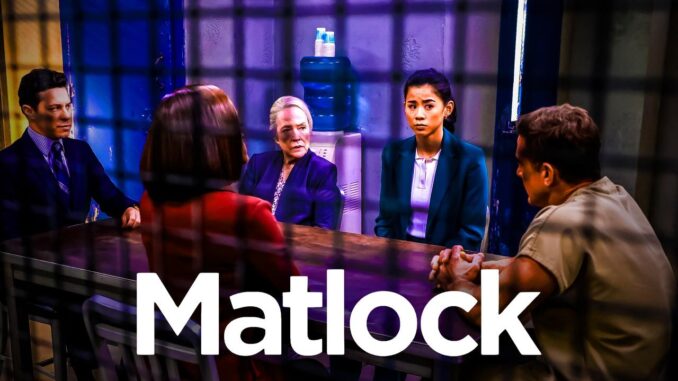
Matlock Season 2 Episode 5’s Overly Convoluted Julian Plot Was Everything That’s Been Off-Track Lately
There are moments when the universe, in its infinite wisdom, hands you a seemingly trivial detail that nonetheless acts as a perfect lens through which to view a broader, more unsettling truth. For me, that moment arrived while rewatching Matlock. Not a highlight reel, mind you, but a deep dive, episode by episode. And then came Season 2, Episode 5 – an installment whose “Julian plot,” a narrative knot tied with all the grace of an intoxicated sailor, revealed itself to be a surprisingly precise metaphor for nearly everything that feels off-kilter in our modern world.
Matlock, in its purest form, is a show built on clarity. It’s the comfort food of legal dramas. Ben Matlock, with his folksy charm, cheap suits, and penchant for hot dogs, doesn’t rely on shocking twists or labyrinthine conspiracies. His brilliance lies in untangling seemingly simple cases, finding the single loose thread that unravels a tidy lie, and presenting the truth with elegant simplicity. We watch Matlock for the satisfaction of a clear resolution, the triumph of common sense over obfuscation, the comforting belief that justice, however slowly, finds its way to the surface. It’s a world where motives are usually discernible, and the villain, once unmasked, is clearly, unambiguously the villain.
Which brings us to the Julian plot of Season 2, Episode 5. Without delving into the excruciating specifics, which frankly blur into a fog of forgettable red herrings and dubious motivations, this particular narrative felt less like a carefully constructed mystery and more like a narrative Escher painting. Suspects multiplied like hydra heads, each introduced with a flimsy motive only to be discarded for another equally flimsy one. Julian, the central figure around whom this narrative vortex spun, seemed less like a character and more like a human MacGuffin, pushed and pulled by a plot that seemed intent on proving its own cleverness through sheer volume of interconnected, yet ultimately irrelevant, sub-plots. The resolution, when it finally arrived, felt less like an earned revelation and more like the exhausted surrender of a writer who had simply run out of convoluted alleys to explore. It was a climax built on exhaustion, not elegant deduction.
And here’s where the Matlockian misstep becomes our modern parable. This Julian plot, with its gratuitous complexity, its endless detours that led nowhere, its sheer inability to commit to a straightforward path, is a perfect microcosm of what feels so “off-track” lately.
Consider the landscape of contemporary media. We live in an age of the “mystery box,” where shows dangle tantalizing, often unanswerable, questions for seasons on end, frequently disappointing with rushed, nonsensical conclusions. Plot twists are implemented for shock value rather than organic development. Narratives are layered with so many sub-plots, flashbacks, and alternative timelines that the core story, the point of it all, gets lost in a digital haze. We crave the thrill of the complicated, but often mistake convolution for depth, and in doing so, we sacrifice the clean, satisfying arc that once defined good storytelling. The Julian plot, too, seemed to mistake its own convoluted nature for intellectual rigor, when in reality, it was simply a tangled skein of narrative yarn.
Beyond entertainment, this phenomenon permeates our information ecosystem. From social media feeds to news cycles, we are constantly bombarded with conflicting narratives, half-truths, and fully formed fictions. Simple issues are deliberately complicated by partisan rhetoric, drowning out rational discourse in a sea of ad hominem attacks and what-about-isms. Finding a clear, unvarnished truth feels like navigating that Matlock episode – every turn introduces another suspect, another motive, another layer of spin, until the very concept of objective reality becomes as elusive as Julian’s true intentions. We become exhausted, like Matlock must have felt in that episode, just trying to ascertain the basic facts.
Even in our personal lives, we often fall victim to the Julian plot’s allure. Simple problems are overthought, over-analyzed, and over-complicated. We construct elaborate mental flowcharts for decisions that could be made with a gut feeling or a clear set of priorities. We confuse busy-ness with productivity, mistaking constant motion through an intricate self-made labyrinth for actual progress. We’ve been conditioned to believe that complexity equals intelligence, that the simplest solution must be overlooking something critical, leading us down rabbit holes that ultimately waste time, energy, and mental peace.
What the Julian plot of Matlock S2E5 unwittingly illustrates is our collective yearning for clarity amidst the cacophony. We pine for the confident simplicity of Matlock’s closing arguments, where the truth, once revealed, stands undeniable and unburdened by unnecessary frills. We yearn for narratives, both fictional and real, that respect our intelligence enough to be direct, to build toward a satisfying resolution without cheap tricks or endless, pointless detours.
That single, unremarkable Matlock episode, with its bafflingly convoluted Julian plot, serves as a poignant reminder that sometimes, the greatest wisdom lies not in the intricate knot we can tie, but in the elegant, purposeful simplicity with which we can untangle it. It’s a call to action, perhaps, to ourselves, to demand more clarity, more intentionality, and less gratuitous convolution, both in the stories we consume and in the lives we lead. Perhaps then, we can all get back on track.
